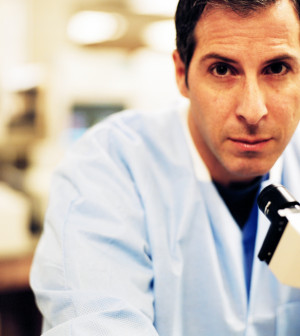- Double Mastectomy May Offer No Survival Benefit to Women With Breast Cancer
- Toxic Lead Found in Cinnamon Product, FDA Says
- Certain Abbott Blood Sugar Monitors May Give Incorrect Readings
- Athletes Can Expect High Ozone, Pollen Counts for Paris Olympics
- Fake Oxycontin Pills Widespread and Potentially Deadly: Report
- Shingles Vaccine Could Lower Dementia Risk
- Your Odds for Accidental Gun Death Rise Greatly in Certain States
- Kids From Poorer Families Less Likely to Survive Cancer
- Tough Workouts Won’t Trigger Cardiac Arrest in Folks With Long QT Syndrome
- At-Home Colon Cancer Test Can Save Lives
Only Close Family History Needed for Cancer Risk Assessment


Oncologists need to carefully document a new patient’s family history of cancer to assess the genetic risk, but assessing close relatives is enough, new recommendations suggest.
Gathering information about cancer in first- and second-degree relatives will help identify patients with an increased hereditary risk to provide them with personalized short- and long-term management and treatment strategies, the American Society of Clinical Oncology said.
The new recommendations, published in the Journal of Clinical Oncology, are a change from the current standard of recording three generations of family history, according to a society news release.
“After reviewing the available evidence, [the organization] concluded that reported family history is most accurate in close relatives and loses accuracy in more distant relatives,” according to the news release. “On the basis of this data, a history of cancer in first- and second-degree relatives is often sufficient.”
First-degree relatives include parents, children and full siblings; second-degree relatives include grandparents, aunts and uncles, nieces and nephews, grandchildren and half-siblings. About 10 percent of all cancers are hereditary cancers, according to the news release.
“Genetic factors are a key component of precision medicine because they can unlock important information that can help an oncologist determine the best course of individualized treatment,” society president Dr. Clifford Hudis said in the news release.
“An adequate family history is key to identifying those patients whose cancer may be associated with inherited genetic factors,” he said.
The recommendations say the recording of a patient’s family history should include the relative’s type of primary cancer, their age at diagnosis, their ethnicity and whether the relative is on the patient’s mother’s or father’s side of the family. Patients should also be asked about the results of any cancer genetic testing in any relative.
“Ongoing hereditary risk assessment is part of high-quality oncology care,” Hudis said. “These recommendations provide clarity, guidance and support for the oncology professional and other specialists regarding what information to collect for a cancer family history and how to interpret it.”
More information
The U.S. National Cancer Institute has more about cancer.
Source: HealthDay
Copyright © 2024 HealthDay. All rights reserved.










